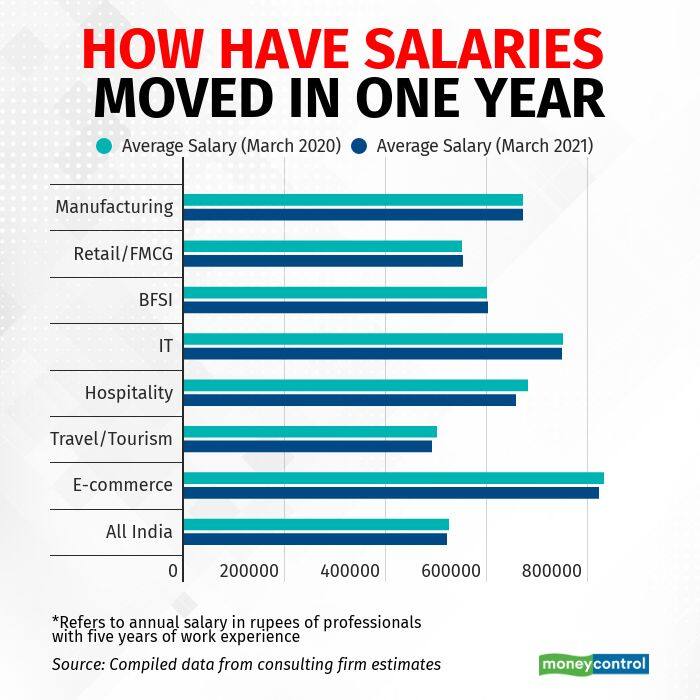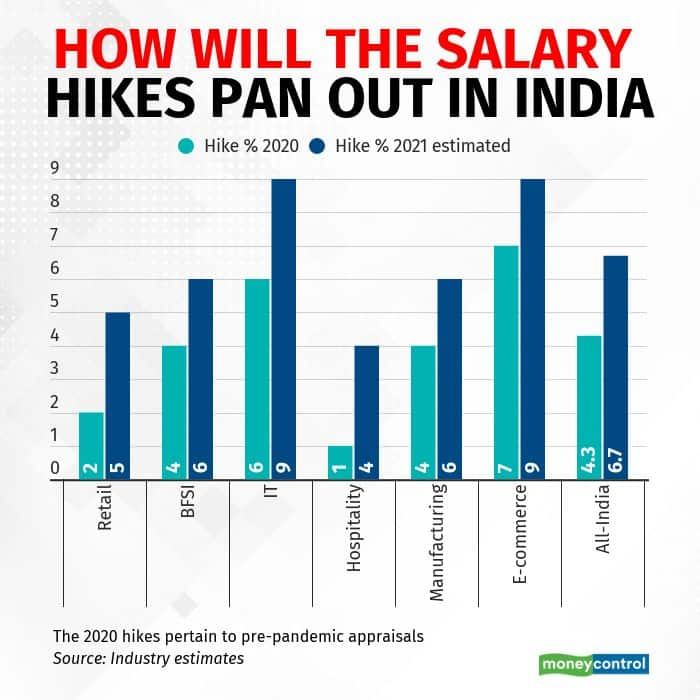Pradeep Kadam, 28, is head sales manager at a retail brand in Mumbai. He had a team of 12 people at the store before the Coronavirus outbreak stopped everyone in their tracks in March 2020.
Today, his sales staff has shrunk to six and the company has no plans to hire replacements.
“I am from Mumbai, so I didn’t have to go out of town once the lockdown was declared. But most of my colleagues were from Uttar Pradesh and Kerala and they decided to go back home. The company let go of five people in June and the other two never came back. Work pressure is a lot, and we inevitably end up slogging long hours,” he states, regretfully.
Amidst the Coronavirus outbreak, close to 0.7 million people remain unemployed in India. At its peak in July 2020, about 10 million people had lost their jobs. Now, with stores and businesses resuming full time work – minus the complement of helping hands - the existing staff is stressed out.
Data compiled by Moneycontrol based on discussions with a dozen HR consultants, showed that the average salaries across sectors has by and large remained the same, with a marginal decline evident in some industries.
At an all-India level, for a professional with five years of work experience, the pay stands at Rs 5.2 lakh per annum (PA), like the previous year. This is even though working hours are longer and many job roles continue to be vacant.
Also Read: How many lost their jobs in the pandemic
Pankaj Das Gupta, an independent HR consultant catering to the retail and FMCG sector, told Moneycontrol that the situation in these two sectors is precarious.

“Staff at retail stores are among the lowest paid and they don’t have the option to work-from-home. Transport hasn’t resumed completely across metro cities, so they also end up spending a bigger amount on travel, which is not compensated,” he explained.
Among the sectors, retail, hospitality, travel, and tourism were the worst hit. Sadly, travel and tourism continue to languish, even though some green shoots are visible.
Shop floor staff suffer the most
The analysis by Moneycontrol revealed that even with the same work experience, retail sector staff were the lowest paid in the country with an average salary of Rs 5.5 lakh PA in March 2020. A year later, things have not changed.
Disha Satpathy, who heads a recruitment agency for supply of mid-level staff for states like West Bengal, Odisha, and Bihar, told Moneycontrol that companies are looking for cheap talent.
“Even though the festive season sales numbers, October-November 2020, have been positive, it hasn’t translated into higher salaries for the employees or replacement hires at the mid-level with 4-5 years of experience. This is because the effects of the four-month complete lockdown are yet to wear off,” she added.
Satpathy also admitted that working hours have been stretched across the sector, with little or no pay for overtime. The Factories Act 1948 stipulates that adult workers cannot work more than 48 hours a week or nine hours a day.
But the festival season sales were hardly festive for employees, who ended up working much longer hours due to the absence of adequate sales staff.
As per law, workers can report any violation to the labour commissioner of their respective states, but the fear of a certain job loss keeps employees away from doing that.
Apart from having to spend from their own pockets for travel, workers in the retail sector had to face additional safety risks at the stores.
Sona Pradhan, a 23-year-old sales staff at a luxury accessories store in Kolkata, recounted, with horror, how shoppers would often remove their masks.
“Two sales staff were dedicated only to maintaining social distancing at entry and exit points, while two others had been let go. This meant store manpower was curtailed. If I fell sick, my employer wouldn’t have compensated me for the medical bills. And considering the festive season rush, I didn’t have the option to take leave. It was a tough market. At least we could have been given some bonuses or pay hikes for the extra work we put in,” she suggested, hopefully.
The situation is similar in the manufacturing sector. While companies have hired temporary workers in production units, staff claim that it is inadequate.
The head of human resources at a large consumer electronics firm, told Moneycontrol that since revenues are under pressure, pay rise or special bonuses are not feasible now.
"We understand that there have been additional work duties on existing employees. But considering the top line pressures, sudden pay increases are not possible. However, the situation will be reviewed by July 2021," he added.
Corporate workers don’t have it any better
Sumit Goradia, MD at GD Goradia HR Services in Pune, told Moneycontrol that salaries have remained stagnant, despite the IT and ITeS sectors now switching to a hybrid working model.
“The IT/ITeS sector did see some layoffs during the initial period of the lockdown. But there was a lot of involuntary attrition in the smaller companies as well and replacement hires have been few. This automatically increases the job responsibilities of existing staff almost at the same salary,” he admitted.
However, Goradia suggests that by mid-2021, IT sector hikes will be back on track – in other words, good news for employees. He adds that 7-9 percent average hikes could be offered.

Moneycontrol had earlier reported that double-digit job hikes would be out of the question.
The scenario is much the same in the e-commerce sector where corporate employees have, in fact, been subjected to an overall decline in salaries.
"Salaries are yet to be restored in the digital technology space and start-ups. This is even though layoffs have been rampant in this sector. This essentially means that the existing staff is saddled with multiple responsibilities at no special pay," said Sameer Abbas, a recruitment consultant from Mumbai.
Is the worst over?
While the vaccination drive for COVID-19 has begun across India, industry sources said there was hardly any correlation with pay hikes across the sector, which will take time.
Sabrina Thomas, an HR consultant who advises companies on compensation strategies, predicts that pay hikes will be far-and-few in the middle management and senior levels in 2021.
"There is a definite rise in average work hours, be it at physical offices or remote working. However, the economic conditions are not ripe to go all out and offer 10-15 percent hikes. The appraisals will be muted and very selective," she added.
Sectors like hospitality and tourism are yet to recover from the economic shock of the lockdown, with pay cuts and layoffs still rampant.
Vinita Oberoi, a recruitment consultant from Mumbai, told Moneycontrol said that travel agencies have not resorted to heavy pay cuts, which went up to 40 percent, but neither have they started to hire. Her advice to retail customers: start shifting to other sectors.
For employees at India Inc, the wait for a pay that complements their current workload is only getting longer – and less rewarding than ever.